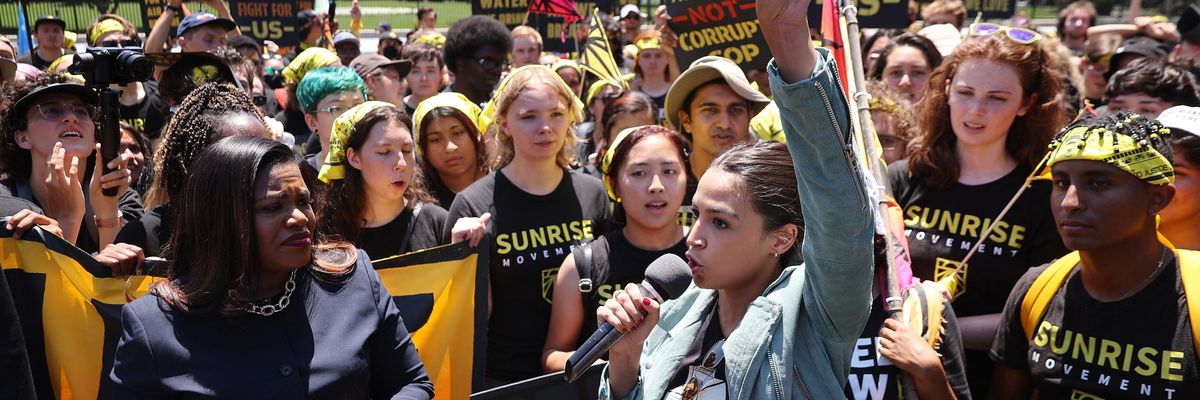Rep. Alexandria Ocasio-Cortez of New York warned Sunday that if congressional Democrats ultimately fail to approve the Build Back Better Act after passing a limited--and deeply flawed--bipartisan infrastructure bill, the U.S. will be at risk of throwing away its "biggest chance to combat climate change."
The New York Democrat characterized the Build Back Better (BBB) reconciliation package--a roughly $1.8 trillion bill containing a range of climate and safety-net investments--and the $550 billion infrastructure measure (BIF) as "interlocking policy" rather than two separate pieces of legislation, stressing that the potential benefits of the latter will only be realized if the former becomes law.
"BIF's climate benefits only unlock if BBB passes," Ocasio-Cortez argued. "If BBB is gutted/dies, we may have just locked in U.S. emissions."
Ocasio-Cortez was one of six House Democrats to vote against the bipartisan bill on Friday because it violated progressives' longstanding demand that the Build Back Better Act pass simultaneously. Despite opposition from the six progressives, the Senate-approved bipartisan bill passed the House after 13 Republicans crossed the aisle to support it.
President Joe Biden is expected to sign the bill in the coming days as world leaders continue to negotiate global solutions to the climate crisis at the COP26 summit in Glasgow, Scotland. In recent weeks, the United Nations, the International Energy Agency, and other institutions have warned that nations must immediately halt all new investments in fossil fuels and rapidly transition to renewable energy if the world is to limit warming to 1.5degC by the end of the century.
While the bipartisan measure includes some climate resilience provisions, funding to replace the nation's lead water pipes, and money for electric vehicle charging stations, environmentalists have stressed that the legislation on its own could represent an overall setback in the push to lower U.S. greenhouse gas emissions.
"The BIF is not a climate bill," the advocacy group Friends of the Earth (FOE) Action noted over the weekend, pointing to a recent analysis showing that the measure contains up to $25 billion in handouts for the fossil fuel industry, which has lobbied aggressively against the reconciliation package.
Related Content
Bipartisan Infrastructure Bill Rebuked for Funding False Climate Solutions
Brett Wilkins
Last month, Biden dropped a major clean electricity program from the Build Back Better Act after Sen. Joe Manchin (D-W.Va.)--a coal profiteer and an ally of the oil and gas industry--made clear he would oppose it. Democrats are also worried that Manchin, a necessary vote in the evenly divided U.S. Senate, will kill the reconciliation bill's fee on methane, a major contributor to the climate crisis.
And now that the bipartisan bill has passed the House, progressives are increasingly concerned that Manchin and other conservative Democrats will oppose the reconciliation package altogether, tanking a centerpiece of Biden's domestic policy agenda and killing significant clean-energy investments.
"The oil and gas lobby was working overtime this week to kill the methane fees in BBB to ensure it didn't pass with BIF," Ocasio-Cortez wrote Sunday. "If BBB isn't delivered with BIF's oil and gas locked in, we're in trouble. That is what makes it a huge gamble. So again, we need pressure to deliver the promise on BBB."
Rep. Pramila Jayapal (D-Wash.), the chair of the Congressional Progressive Caucus (CPC), said Friday that she secured a commitment from the House Democratic leadership for a vote on the Build Back Better Act "no later than" next week--but it's unclear whether corporate-backed conservatives in the House will drop their objections and support the bill.
If it clears the House, the bill will then move to the Senate, where an estimated one in four lawmakers holds investments in the fossil fuel industry.
"We may not get another chance to do this," said Evan Weber of the Sunrise Movement, a youth-led advocacy group that is calling for passage of the reconciliation bill while criticizing it as badly inadequate and demanding further action.
"The stakes are existential," Weber added. "Failure is not an option."





